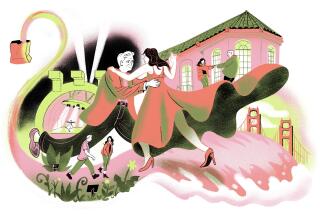Love Is in the Dailiness Maybe More Than in the Grand Bursts of Romance
On this St. Valentine’s Day love is costly. More than 5,000 men and women are paying $12 and up to have the Washington Post print their “Love Notes.” The paper has been romantically involved for 10 years. Gobs of money are earned: $101,000 in 1987 for 37,122 classified lines, with 11 choices in the size of hearts above or below the words of ardor.
Last year the Post carried 10 pages of messages. A big spending lover named “Me” paid $146 to tell “Phyllis” in 70 lines of his passion. “I wanted badly to send you a bouquet of roses,” the loving “Me” pined, “but I’m afraid you’ll return them and call the police again.”
From unrequited persisters to spewers of cutesy-pie metaphors--”V.L.: You charge my battery when I fill your tank”--the 10 pages of newspaper messages raise higher than the arc of Cupid’s arrow the idea that love, and plenty of it, is throbbingly out there.
Short of a morning at divorce court or an evening of dread at a singles bar, the surest means of keeping a steady head in this annual Valentinian gush of romance is to return to those who have thought deeply and sagely about love. One is Erich Fromm, another is Merle Shain.
Fromm’s “The Art of Loving” is a thin volume thick with both theory and instruction. I read it first in college, and in the 30 years since have bought and given away at least a dozen copies, with about that many re-readings for myself.
“There is hardly any activity, or any enterprise,” Fromm wrote, “which is started with such tremendous hopes and expectation, and yet, which fails so regularly, as love. If this were the case with any other activity, people would be eager to know the reasons for the failure, and to learn how one could do better--or they would give up the activity.”
People can become ex-lovers, ex-husbands or ex-wives, but no one is ever an ex-seeker as long as one more beat is left in the heart. What we have are plenty of ex-artful seekers, those who have wearied of creating the conditions to be lovable and loving. Fromm believed, “Aside from learning the theory and practice, there is a third factor necessary to becominga master in any art--the mastery of the art must be a matter of ultimate concern; there must be nothing else in the world more important than the art. This holds true for music, for medicine, for carpentry--and for love. And, maybe, here lies the answer to the question of why people in our culture try so rarely to learn this . . . . In spite of the deep-seated craving for love, almost everything else is considered to be more important than love: success, prestige, money, power--almost all our energy is used for the learning of how to achieve those aims, and almost none to learn the art of loving.”
Even those who do become artists at loving are not guaranteed pain-free relationships. All that’s assured is that love can deflect the pain and prevent it from becoming suffering. Few have written more movingly about this than Merle Shain, a Toronto writer whose book “Courage My Love” (Bantam) is being published this month.
Where Fromm states theoretically that “Love is primarily giving, not receiving,” Shain writes in personal language about the transaction: “A lot of men have borrowed me to massage themselves and I have borrowed some, but rarely did I find a man who really cared to find out who it is I am.”
In the “Love Notes” in the Post, hardly a syllable of doubt is found: Assurances about the other person’s lovableness and the note-writer’s worthiness of receiving its surplus ooze from the page. Forever and always and you alone.
“It’s not easy to know when one gives love and when one asks for it,” Shain writes, “where one person’s ego starts and another’s ends, when another’s need is greater than yours, and yet these are questions one must ask if one wants to talk of love. Because often when we think we are saying, ‘These are my jewels,’ as we lay them at another’s feet, what they are hearing is, ‘This is a stick-up. Hand over yours!’ Which is why, of course, they retreat.” And separate or divorce or pledge never again to be a fool for love.
In the ‘70s, people described themselves as survivors. The post-survival ‘80s have copers--men who clean the dishes or take the kids to the playground and women who are breadwinners but not above baking an occasional loaf. Love is in those kinds of dailiness, maybe more so than in the grand bursts of romance at $12 for three classified lines and $2 for each line after. It’s fine to put love into print, but putting it into practice is the enduring art.


